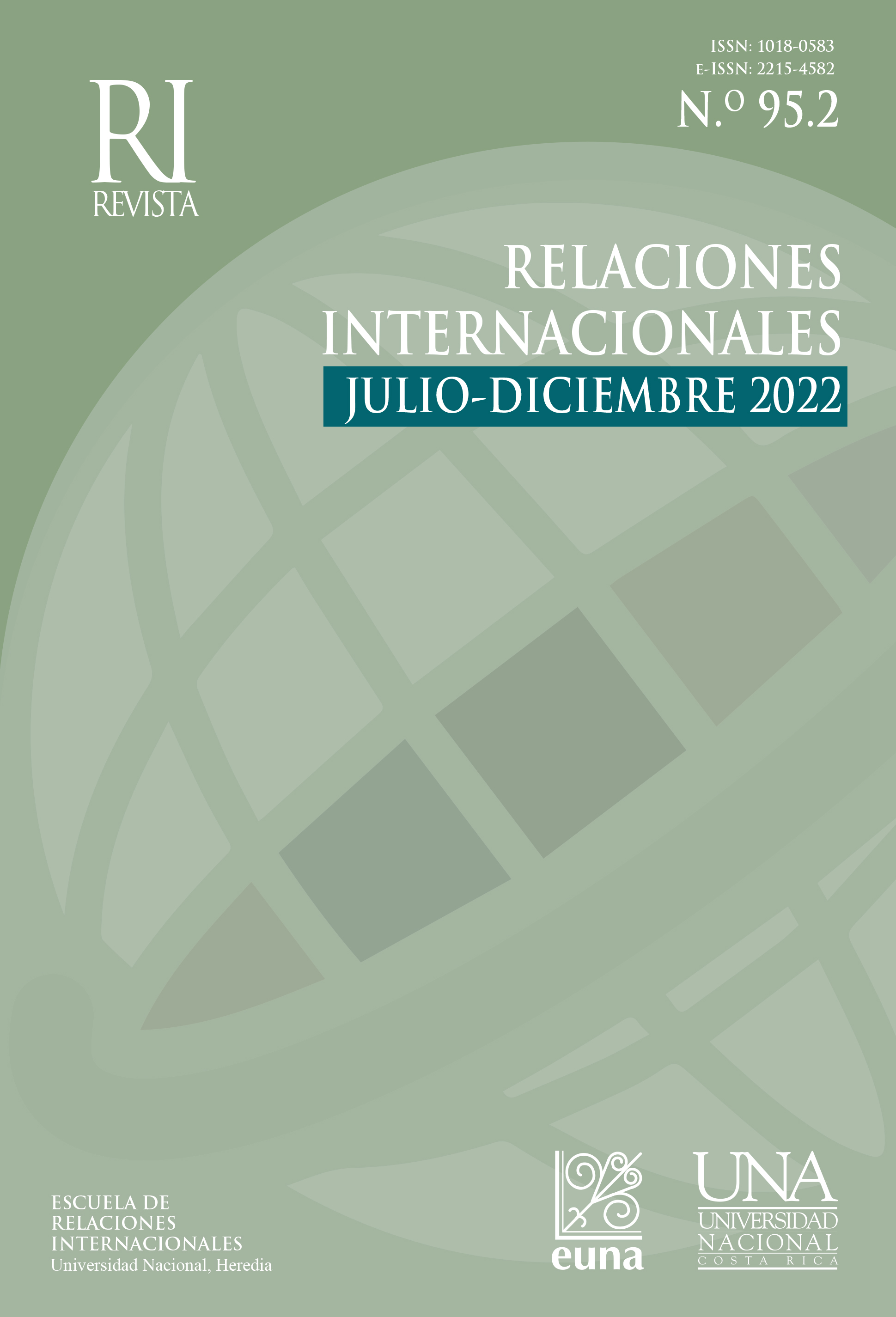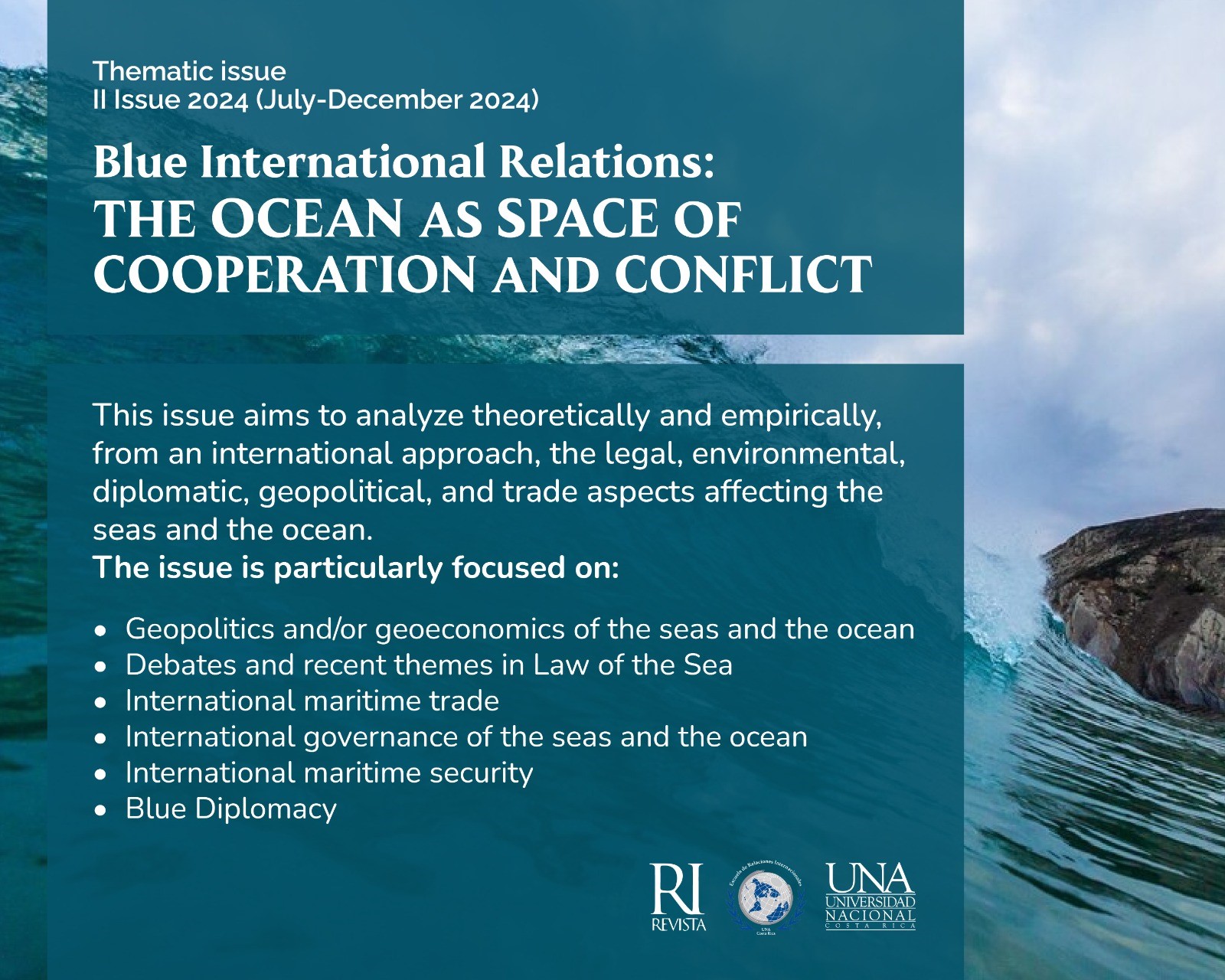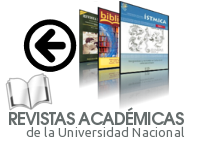COVID-19: Perspectives from International Studies
Keywords:
COVID-19, editorial, global health, interdependence, International Relations, securityAbstract
This thematic issue 95.2, COVID-19: Perspectives from International Studies shows the interest of our journal to offer academic spaces for understanding the dimensions and possible scope of the pandemic in the international context. Thus, the objective of gather reflections regarding political, social, and economic aspects related to this pandemic. All this is from different analytical perspectives offered by the fascinating, complex, changing, and challeging International Relations discipline within a highly connected and interdependent society.
References
Angus, C. (2022). The tide of the COVID pandemic is going out – but that doesn’t mean big waves still can’t catch us. The Conversation. Recuperado de https://theconversation.com/the-tide-of-the-covid-pandemic-is-going-out-but-thatdoesnt-mean-big-waves-still-cant-catch-us-185923
Beer, F. A. y Hariman, R. (2020). Nature Plays Last: Realism, Post-Realism, PostPandemic. E-INTERNATIONAL RELATIONS. Recuperado de https://www.eir.info/2020/06/07/nature-plays-last-realism-post-realism-post-pandemic/
Blanco, F., Enrrullahu, D. y Soto, R. (2020). Do Coronavirus Containment Measures Work? Worldwide Evidence. World Bank Group. Recuperado de https://openknowledge.worldbank.org/bitstream/handle/10986/34912/Do-Coronavirus-Containment-Measures-Work-Worldwide-Evidence.pdf;sequence=1
Brown, R. (2022). COVID-19 and International Political Theory Assessing the Potential for Normative Shift. Palgrave Macmillan. https://doi.org/10.1007/978-3-030-91952-8
CDC. (5 de enero de 2022). CDC Museum COVID-19 Timeline. Recuperado de https://www.cdc.gov/museum/timeline/covid19.html
Chand, R. (2008). The Global Food Crisis: Causes, Severity and Outlook. Economic and Political Weekly, 43(26/27), 115-122. http://www.jstor.org/stable/40278908
Davies, M. y Hobson, C. (2022). An embarrassment of changes: International Relations and the COVID-19 pandemic. Australian Journal of International Affairs, 0(0), 1-19. https://doi.org/10.1080/10357718.2022.2095614
Davies, S. E. y Wenham, C. (2020). Why the COVID-19 response needs International Relations. International Affairs, 96(5), 1227-1251. https://doi.org/10.1093/ia/iiaa135
Devereux, S. (2000). Famine in the Twentieth Century. IDS Working Paper, issue 105. Institute of Development Studies. https://www.ids.ac.uk/publications/famine-in-the-twentieth-century/
Drezner, D. W. (2020). The Song Remains the Same: International Relations After COVID-19. International Organization, 74(S1), E18-E35. https://doi.org/10.1017/S0020818320000351
Ettinger, A. (2022). Teaching World Politics in an Age of Crisis. En Szarejko, A.(ed), Pandemic Pedagogy Teaching International Relations Amid COVID-19 (pp. 3-19). Palgrave McMillan.
Gibson-Fall, F. (2021). Military responses to COVID-19, emerging trends in global civil-military engagements. Review of International Studies X, 1-16. https://doi.org/10.1017/S0260210521000048
Jasanoff, S. (2021). Humility in the Anthropocene. Globalizations, 18(6), 839-853. https://doi.org/10.1080/14747731.2020.1859743
JHU. (2022). COVID-19 Dashboard. Recuperado de https://coronavirus.jhu.edu/map.html
Kirke, X. (2020). Anxiety and COVID-19: The Role of Ontological Security and Myth. E-INTERNATIONAL RELATIONS. Recuperado de https://www.e-ir.info/2020/05/29/anxiety-and-covid-19-the-role-of-ontological-security-and-myth/
Kurki, M. (2021). Relational revolution and relationality in IR: New conversations. Review of International Studies, 1-16. https://doi.org/10.1017/S0260210521000127
Morales-Camacho, M. (2022). 2022: Lo impredecible como constante. Relaciones Internacionales, 95(1), 7-12. https://www.revistas.una.ac.cr/index.php/ri/article/view/16674
Pernecky, T. (Ed.). (2020). Postdisciplinary Knowledge. Routledge.
Sterling-Folker, J., Freyberg-Inan, A., Wilcox, L., Ozguc, U. y Shinko, R. E. (2021).
Forum: Thinking Theoretically in Unsettled Times: COVID-19 and Beyond. International Studies Review, 23(3), 1100-1125. https://doi.org/10.1093/isr/viab018
Szarejko, A. (Ed). (2022).Pandemic Pedagogy. Teaching International Relations Amid COVID-19. Palgrave McMillan. https://doi.org/10.1007/978-3-030-83557-6
The Economist. (2021). The new normal is already here. Get used to it.The Economist. Recuperado de 2022, de https://www.economist.com/leaders/2021/12/18/the-new-normal-is-already-here-get-used-to-it
WHO. (2022). Timeline: WHO’s COVID-19 response. Recuperado de https://www.who.int/emergencies/diseases/novel-coronavirus-2019/interactive-timeline#event-9
Published
How to Cite
Issue
Section
License

Revista de Relaciones Internacionales por Universidad Nacional de Costa Rica está bajo una Licencia Creative Commons Atribución-NoComercial-SinDerivar 4.0 Internacional








1.png)







3.png)
